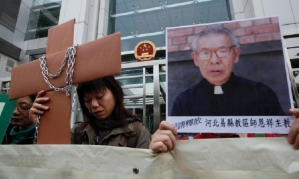
Bishop Cosmas Shi Enxiang of Yixian, an underground priest who spent nearly forty years in various Chinese prisons and labor camps, has died at age 94 while in custody of the Communist government.
According to an independent Catholic news service, Bishop Shi had not been seen since since his arrest on April 13, 2001 at his niece's home in Beijing. He was reportedly held without charge or due process.
"We were informed by Baoding city government officials on Friday morning but they did not say when he died exactly or the cause of his death," his great-niece Shi Chunyan, 42, said.
"We are now waiting for the prelate, whether it be his body or ashes, to be returned to Shizhuang, our hometown, before we decide what to do next," she said.
"My parents and the bishop's other siblings are particularly sad. They had been unsuccessfully trying to discover his whereabouts for many years. Now the answer to their questions is that he is dead," she said.
Bishop Shi was detained for a total of 40 years by the Communist government due to his Christian beliefs, such as preaching against abortion and female infanticide. He was officially ordained in 1947, but was imprisoned several years later when Chinese dictator Mao Zedong demanded Chinese Catholics sever ties with the Vatican and close all church doors. From 1957 to 1980, the priest was forced to do hard labor first at a labor camp in Heilongjiang province, then in coal mines in Shanxi province. He was rearrested in 1989 and released in 1993. His final detention, which took place in an undisclosed location, lasted 14 years.
According to the Associated Press, appeals from around the world to the government for information about him always went unanswered.
The Bishop's death has saddened Chinese Christians around the world, who took to social media to expressing their sorrow and also their pride that they had another "martyr in the Church," reports the AP.
"His generation felt the brunt of Chinese Communist cruelty, but his death as a religious prisoner reminds us that religious repression in China is far from over,' writes Nina Shea, director of Hudson Institute's Center for Religious Freedom. "Bishop Shi is an inspiration within China. His witness should inspire all Christians, and his courage to resist oppression, all of us."
Today, Beijing allows Christians to worship openly, but it has no formal relations with the Vatican and insists that the Communist Party-controlled Chinese Catholic Patriotic Association alone has the authority to appoint bishops.
However, on January 21, Hua Chunying, a spokesman of the foreign ministry, said that for the first time in decades, the Chinese government is "willing to have constructive dialogue with the Vatican based on relevant principles."
Hua has also added that "China is always sincere in improving ties with the Vatican, and has been making efforts to this end."







